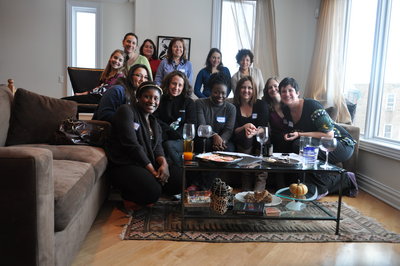“I had been searching for several years for what I thought was my purpose,” Dining for Women’s founder Marsha Wallace said. She was a nurse with four children, and knew one day those children would grow up and leave home. She did not want to be a staff nurse forever.
“I had the sense there was something really important I was supposed to do. I just wasn’t sure what.”
Wallace read an article about social workers who got together and had pot luck dinners and who donated what they would have spent in restaurants to underprivileged families. She found the idea brilliant, and filed it away in her brain.
One morning in 2003 while Wallace was meditating, it hit her “like a bolt of lightning” that she could raise money for women in developing countries, too. So for her birthday that year, she did what she had read about.
“It wasn’t this idea of, ‘I’m going to start a nonprofit organization with a mission’,” she said. “It was this ‘aha’ idea and then a dinner at my house which eventually turned into what it is today. To be honest, if I had known then how big we’d get, I would have been scared to death.”
Dining for Women currently has over 8,000 members, chapters in 39 states, and international chapters throughout the world.
Resident Kirsten Bunch runs the Weehawken chapter that has raised over $3,000 for the cause in just over a year.
The organization’s headquarters handle all donations, provide educational materials, and conducts an extensive vetting process to ensure the monthly charities give the most to women and girls.
“Education is integral to the mission,” Wallace said. “Once you know better, you do better.”
Dinner out vs. one month’s salary
It’s not unreasonable for the average American to spend around $30 on a decent dinner out. In fact, with ever-rising food costs, that amount may lie on the low end.
According to statistics from the World Bank, 1.4 billion people in the world were living on less than $1.25 per day in 2005. According to Wallace, 75 percent of those who live on less than a dollar a day are women and girls.
Considered in the larger context of global poverty, that reasonable dinner becomes a woman’s monthly earnings.
Dining for Women has raised over $1.4 million through its national and international chapters for women and girls in extreme poverty, Wallace reported. Once a month, each chapter holds a potluck dinner as an alternative to dining out and donates what they would have spent at a restaurant – and in some cases beyond that – to the organization’s pre-screened charity.
Bunch not only runs Weehawken’s Dining for Women chapter, but also serves as one of the organization’s board of directors. Her work in the international development field has informed and inspired her role with the organization.
“I really connected with the mission,” Bunch said. “A lot of my friends and family don’t really understand the work that I do, and Dining for Women is a great way for them to connect to the critical issues women and girls face around the world.”
“Knowing her interest in global development, and particularly in women, Kirsten has been a huge asset to the organization,” Wallace said. “We’re happy to have a chapter in Weehawken.”
“Once you know better, you do better.” – Marsha Wallace
__________
Why women and girls?
The United Nations set eight millennium development goals this year with the aim to cut extreme poverty in half by 2015. Five of those, Wallace explained, are directly related to women and children.
“Women are the smartest way to address global poverty because they reinvest over 90 percent of all of their resources back into their families and communities,” she said. “Men contribute a much smaller percentage, so from a strictly business standpoint, investing in women and girls is more profitable.”
Wallace reported that one woman dies every 60 seconds in childbirth from causes that are easily preventable. Last September, the organization’s chosen charity of the month was the Fistula Foundation.
“That was a really powerful month,” Bunch explained. Fistula is a medical condition that can develop in women after difficult childbirth and can cause death if not treated immediately. It has been eliminated in the United States, but it occurs frequently in poverty-stricken parts of the world.
“The issue was shocking to our members,” Bunch said. “Most didn’t know it existed, and it generated great discussions around what it means for women in developing countries when they can’t get the appropriate care because they can’t get to a hospital.”
That month, she added, the chapter raised nearly $500. Most months average out to $300.
Spreading the word
On Feb. 8, Bunch’s chapter was featured on NBC Nightly News with Brian Williams. A reporter from Cablevision channel 118’s The Neighborhood Journal program saw the segment and called Bunch to arrange to film this month’s Sunday meeting on April 29.
“I’d really like to invite more people to our chapter to learn more about it,” Bunch said. “Dining for Women is a truly powerful example of community and the impact it can have.”
For more information on Dining for Women, visit www.diningforwomen.org. For more information on the Weehawken chapter, email dfwweehawken@hotmail.com.
Gennarose Pope may be reached at gpope@hudsonreporter.com.
